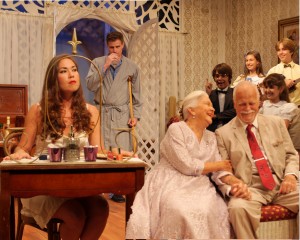You can pick your friends and avoid your enemies, but families are just something you have to live with however you can.
Take solace in the fact that as bad as things might get at home, at least things aren’t bad enough to be the subject of a Pulitzer Prize winning play (though if things are that bad, you have my condolences).
Misery, lies and politics poison and invigorate the players and audience in the form of a familial train wreck you can’t turn away from.
As out of control the characters might be, there was a clear and powerful crispness to the performances that brought the best things out of a classic story of misery and expectations.
Right off the bat I have to say the two most powerful performances were by Big Mama and Big Daddy played by Jo Pruden and Jim Tharp respectively. When either of them was on stage, I was entirely drawn in by their character. I was particularly impressed by their character voices. I stayed after just so I could see if that was actually their natural voice (it wasn’t).
Tharp cuts a very intimidating and powerful figure. His stage presence is impossible to ignore, and I found myself completely convinced of Big Daddy’s dominance over his household.
There were a couple of hiccups in his scenes where there seemed to be a bit of uncertainty regarding lines. Of course, it’s possible there wasn’t any error, but that still leaves the flow-breaking awkwardness that seemed to take over the stage for a brief moment. Let me emphasize this is a relatively minor problem that is compensated for performing fantastically in the other scenes.
Pruden has played Big Mama twice before, and you can see why. Her character seems quite well refined and perfected, with a natural flow and energy to it that you don’t see very often. In fact, she impressed me most of all. I found myself drawn in and entranced by Big Mama, at times wary, but always intrigued by her actions. She was a joy to watch.
As Maggie, “The Cat,” Lauren Murata claims the greatest portion of the first act. It’s difficult to have such a long, uninterrupted line of speech without boring people; particularly if it’s at the beginning of a production. She did a good job, but I’m afraid I did find myself drifting from time to time, feeling like her pseudo-monologue was a little too long.
I didn’t feel the necessity of everything she was saying, and I’m not entirely certain if it was the writing or Murata’s acting. I feel as though Murata is a very talented actress, but she seemed a bit dwarfed next to a few of the other actors. It is a very demanding part, and she does a good job, but it just doesn’t go far enough to be a memorable performance.
Playing opposite almost everyone was Scott Francis Russell as Brick. While he almost certainly logged more stage time than everyone else, he certainly wasn’t anywhere near the most vocal. I was thrown a bit at first, as Russell has the least emphasized accent in the show. Because of the rather obvious contrast between his voice and the other characters, he actually shows himself best when he’s silent. I don’t mean that as a negative thing either. As successfully as he does it, you’d think brooding and looking disgusted was an Olympic sport. Russell successfully creates a disapproving and somehow passively hostile environment that settles over the audience like a thick fog.
Though not nearly as prominent as the other characters, something must be said of the characters of Mae, played by Karen Valasek, and Grouper, played by Tim Jeffryes.
Valasek played an irritating, parasitic, two-faced, catty, kiss-ass whom I very nearly hated. I almost wrote poorly about her before I realized that this is exactly what her character is supposed to be. It’s a bit difficult to judge an actor who has to play the role of a poor actor, and I find myself entirely confused by my feelings of contempt. As this was the purpose of the character, I have settled on applauding Valasek for hitting the part right on the nose. She just felt sometimes out of place being one of the only unsympathetic characters in the play, but that seems to be how the character was written.
Jeffryes played a character of entirely surprising depth and sympathy. Though he could have easily been a forgettable side character, I found myself completely drawn in to his back-story. Part of this could be attributed to the fantastic writing, but a good portion of the credit has to go to Jeffryes’ performance. Even when he the center of attention, I could see so much just through his gestures and glances.
This is not a lighthearted production, but it’s not as heavy and difficult to watch as I would suspect from a group as dysfunctional as this.
Often shows will create caricatures of terrible people, creating awful people motivated apparently only by a driving need to be the biggest ass possible. This isn’t one of those shows, and I appreciate it greatly. This show was full of people. These were people who were filled with sadness and hate, but who all have such good reasons for their pain that you can’t help but pity each and every one of them. This was an altogether impressive show.
Further details about showtimes and upcoming productions may be found on its website.

